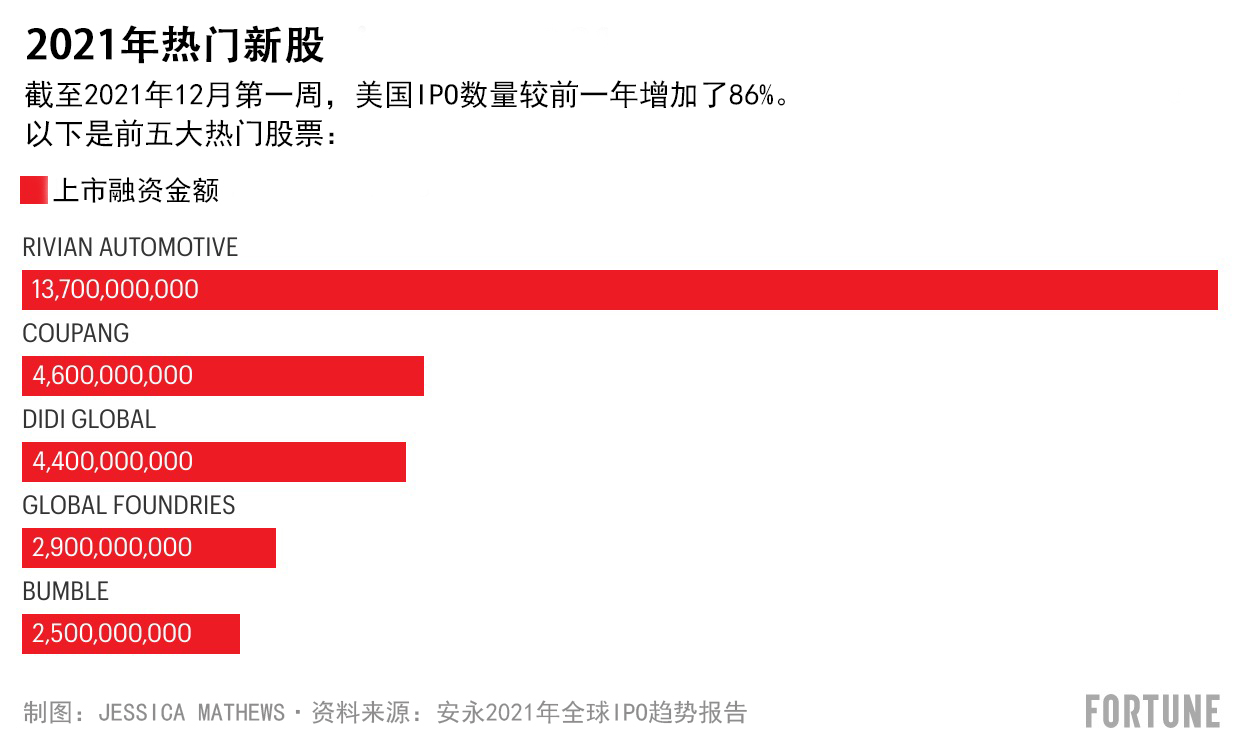公司上市的最佳时机显然是在疫情期间,因为最理想的上市时间是在通胀飞速攀升、劳动力不足和供应链问题日益严重的时期。
IPO制度研究与投资产品公司Renaissance Capital的数据显示,截至2021年12月中旬,接近400家私有公司在美国股市上市,融资1,425亿美元。这是在12个月内公司上市融资的最高总金额。
在当前高估值和股市整体暴涨的大背景下,选择上市的公司源源不断,例如Affirm、ThredUp、Coursera、Oatly、Bumble、Duolingo、Rent the Runway、Rivian Motors、Robinhood等公司都在这段时间上市。
安永(EY)美洲区IPO负责人雷切尔·格林谈到今年公司上市的超高估值时表示:“这种情况显然会吸引公司考虑上市,而不是选择其他融资方式。”几年前,科技公司一直在艰难地维持其在上市之前从风险投资家和私募股权基金那里获得的估值。麦肯锡(McKinsey)2016年的一份报告显示,独角兽公司因为这个原因选择推迟上市。

特殊目的收购公司上市同样火爆,这类公司上市速度更快、更简单,而且更适合小公司。特殊目的收购公司已经存在了二十多年,但过去几年才成为颇受公司欢迎的一种上市方式。安永的IPO报告显示,截至12月8日,共有近150家空白支票公司在美国上市。
但随着2021年接近尾声,IPO繁荣似乎也即将结束,至少目前是这样。
最近几周,受到多重因素的影响,美股市场变得更不稳定,包括具有极强传染力的奥米克戎变异株引发的担忧、持续时间超出预期的通货膨胀、劳动力不足和供应链中断等。无论是因为哪种原因,新上市公司的表现突然间变得好坏不一。《财富》杂志本月早些时候的一项分析显示,今年上市的前100只股票中,有超过一半的交易价格低于首次发行价。
格林表示:“这对于计划上市的公司来说并非好消息。”他认为公司可能会因此推迟上市计划。 “我并不认为这会让市场关闭,但绝对会产生影响。”
自本月初以来,企业提交的S-1文件越来越少。依旧有一些私营企业正在准备上市(其中最值得关注的是Reddit。该公司最近表示已经向美国证监会秘密提交了上市登记报告草案)。
但2022年上市的公司可能会怀念2021年疫情肆虐、通胀攀升的那段美好时光。(财富中文网)
翻译:刘进龙
审校:汪皓
公司上市的最佳时机显然是在疫情期间,因为最理想的上市时间是在通胀飞速攀升、劳动力不足和供应链问题日益严重的时期。
IPO制度研究与投资产品公司Renaissance Capital的数据显示,截至2021年12月中旬,接近400家私有公司在美国股市上市,融资1,425亿美元。这是在12个月内公司上市融资的最高总金额。
在当前高估值和股市整体暴涨的大背景下,选择上市的公司源源不断,例如Affirm、ThredUp、Coursera、Oatly、Bumble、Duolingo、Rent the Runway、Rivian Motors、Robinhood等公司都在这段时间上市。
安永(EY)美洲区IPO负责人雷切尔·格林谈到今年公司上市的超高估值时表示:“这种情况显然会吸引公司考虑上市,而不是选择其他融资方式。”几年前,科技公司一直在艰难地维持其在上市之前从风险投资家和私募股权基金那里获得的估值。麦肯锡(McKinsey)2016年的一份报告显示,独角兽公司因为这个原因选择推迟上市。
特殊目的收购公司上市同样火爆,这类公司上市速度更快、更简单,而且更适合小公司。特殊目的收购公司已经存在了二十多年,但过去几年才成为颇受公司欢迎的一种上市方式。安永的IPO报告显示,截至12月8日,共有近150家空白支票公司在美国上市。
但随着2021年接近尾声,IPO繁荣似乎也即将结束,至少目前是这样。
最近几周,受到多重因素的影响,美股市场变得更不稳定,包括具有极强传染力的奥米克戎变异株引发的担忧、持续时间超出预期的通货膨胀、劳动力不足和供应链中断等。无论是因为哪种原因,新上市公司的表现突然间变得好坏不一。《财富》杂志本月早些时候的一项分析显示,今年上市的前100只股票中,有超过一半的交易价格低于首次发行价。
格林表示:“这对于计划上市的公司来说并非好消息。”他认为公司可能会因此推迟上市计划。 “我并不认为这会让市场关闭,但绝对会产生影响。”
自本月初以来,企业提交的S-1文件越来越少。依旧有一些私营企业正在准备上市(其中最值得关注的是Reddit。该公司最近表示已经向美国证监会秘密提交了上市登记报告草案)。
但2022年上市的公司可能会怀念2021年疫情肆虐、通胀攀升的那段美好时光。(财富中文网)
翻译:刘进龙
审校:汪皓
The best time to take a company public is apparently during a pandemic, ideally while inflation is spiking, labor shortages are rampant and crippling supply chain issues prevail.
Nearly 400 private companies raised $142.5 billion by going public on the U.S. stock exchange by mid-December 2021, according to data from Renaissance Capital, an IPO institutional research and investment product company. That’s more funding than companies have ever managed to raise in a 12-month period.
The stream of public debuts was near-constant: Affirm, ThredUp, Coursera, Oatly, Bumble, Duolingo, Rent the Runway, Rivian Motors, Robinhood, to name a few, all listed shares—with the backdrop of a bloated valuation environment and soaring stock market.
“That clearly makes it attractive for companies to consider a public listing, versus other alternative methods of accessing capital,” says Rachel Gerring, IPO Leader at EY Americas, of the hefty valuations companies have obtained this year. Only a few years ago, tech companies were struggling to maintain the private valuations they secured from venture capitalists and private equity firms on their way into the public market. A 2016 McKinsey report indicated that unicorns were staying private longer as a result.
There’s also the boom in SPACs, or special purpose acquisition companies, which have made it quicker and simpler to list on an exchange—and more accessible to smaller companies. SPACs have really only become a popular means for companies to go public in the last few years, despite being an available method for a couple decades. Nearly 150 blank check companies had listed on a U.S. exchange by December 8, according to an EY IPO report.
But as 2021 comes to a close, it's looking like the IPO boom is over, at least for now.
The stock market has become more erratic in recent weeks, which could be stemming from concerns about the highly contagious Omicron variant, inflation that has persisted for longer than expected, labor shortages, and breaks in the supply chain. Whatever the reasons, performance for newly listed companies has suddenly been quite spotty. A Fortune analysis from earlier this month showed that more than half of the 100 largest IPOs this year were trading below their initial offering price.
“That does not bode well for those who are looking to go public,” says Gerring, who notes companies may be tempted to push back planned listings. "I don't think it itself shuts down the market, but it certainly influences the market."
S-1 filings have slowed to a trickle since the beginning of this month. Although there are still some private companies in transit to the public markets (one of the most notable on the agenda being Reddit, which recently said it had confidentially filed a draft registration statement with the SEC).
For those companies that do make it to the public markets in 2022, however, they may find themselves wishing for the good old days of pandemic-ridden, inflation-plagued 2021.






